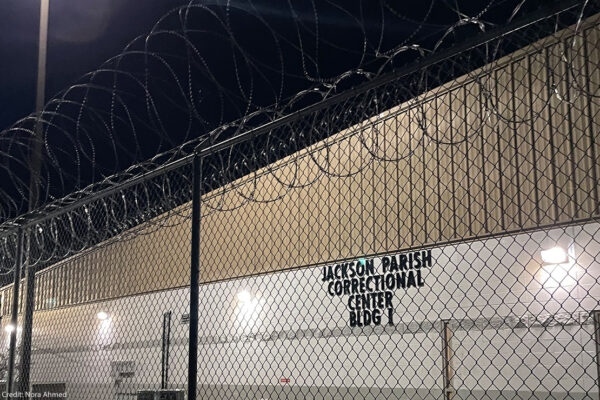ACLU Files Lawsuits After Government Wrongfully Deports U.S. Citizen With Mental Disabilities
(Updated 4/6/2012)
Case Highlights Lack Of Due Process In Immigration Detention System
FOR IMMEDIATE RELEASE
CONTACT: (212) 549-2666; media@aclu.org
ATLANTA – The American Civil Liberties Union, the ACLU of Georgia and the ACLU of North Carolina today filed lawsuits in federal courts in Georgia and North Carolina on behalf of Mark Lyttle, a U.S. citizen with mental disabilities who was wrongfully deported to Mexico and forced to endure over four months of living on the streets and in the shelters and prisons of Mexico, Honduras, Nicaragua and Guatemala.
"What happened to Mark Lyttle is unconscionable," said Judy Rabinovitz, Deputy Director of the ACLU Immigrants' Rights Project. "Our Constitution and our laws demand fair treatment for people with mental disabilities in any court, including immigration courts. Pushing Mr. Lyttle through proceedings that he clearly couldn't understand and then deporting him was not only inhumane but a gross violation of his due process rights. The complete lack of concern for the well being of a man who would have obvious difficulties surviving on his own is truly appalling. What he suffered shouldn't happen to anyone regardless of citizenship status."
Lyttle's entanglement with immigration authorities began when he was about to be released from a North Carolina jail where he was serving a short sentence for inappropriately touching a worker's backside in a halfway house that serves individuals with mental disorders. Despite having ample evidence that Lyttle was a U.S. citizen – including his social security number, the names of his parents, his sworn statements that he was born in the United States and criminal record checks – officials from the North Carolina Department of Correction referred him to Immigration and Customs Enforcement (ICE) as an undocumented immigrant whose country of birth was Mexico. Lyttle had never been to Mexico, shared no Mexican heritage, spoke no Spanish and did not claim to be from Mexico.
The state of North Carolina has an agreement with ICE requiring state officials to report all incarcerated individuals who they believe were born in other countries. ICE began investigating Lyttle and sent him to the Stewart Detention Facility, an immigration detention center in Lumpkin, Ga. where he spent six weeks.
Although ICE knew of Lyttle's long and documented history of mental illness and noted he did not comprehend the investigation of his status, he was not offered legal assistance and was deported to Mexico.
"Mr. Lyttle's disabilities were obvious and well documented but the government offered him no legal assistance and worse still, failed to even perform the normal verification procedures on his legal status," said Azadeh Shahshahani, Director of the National Security/Immigrants' Rights Project at the ACLU of Georgia. "No reasonable basis existed to suspect that Mr. Lyttle was not a United States citizen."
Lyttle was left alone and penniless in Mexico and unable to communicate in Spanish. Mexican authorities sent him to Honduras, where he was imprisoned and faced with guards who threatened to shoot him. Honduran officials sent him to Guatemala and, eventually, he made his way to the U.S. Embassy in Guatemala City. Within a day, embassy officials contacted one of Lyttle's three brothers at the military base where he was serving, leading to Lyttle being issued a U.S. passport. His brother wired him money and Lyttle was soon on a flight to Atlanta. Upon Lyttle's arrival, border officials, seeing his history of ICE investigations, held and questioned him for several hours before letting him go.
During this four month ordeal, Lyttle was unable to take his medications to treat his mental illnesses and was subject to cycles of manic activity and depression. He is now living in Griffin, Ga., where he is recovering and receiving medication for his mental health problems.
"I didn't think what happened to my brother could ever happen in America. We're supposed to be protecting people's rights and freedoms here," said David Lyttle, another of Mark Lyttle's brothers and who is currently living in South Carolina. "Nothing can take back what he suffered, but I hope this lawsuit prevents other people from going through the same thing he did."
The lawsuits, filed by the ACLU in conjunction with lawyers at Troutman Sanders in Georgia and McKinney & Justice in North Carolina, seek damages and injunctive relief for violations of Lyttle's constitutional rights to due process and equal protection.
Copies of today's lawsuits are available online at: www.aclu.org/immigrants-rights/lyttle-v-united-states-america-et-al
The widespread failure of the Department of Homeland Security and the Department of Justice to implement a system to identify immigration detainees who have severe mental disabilities and provide them assistance throughout the detention and court process was recently documented in a report jointly published by the ACLU and Human Rights Watch. The report can be found at: www.aclu.org/human-rights/deportation-default-mental-disability-unfair-hearings-and-indefinite-detention-us-immig



